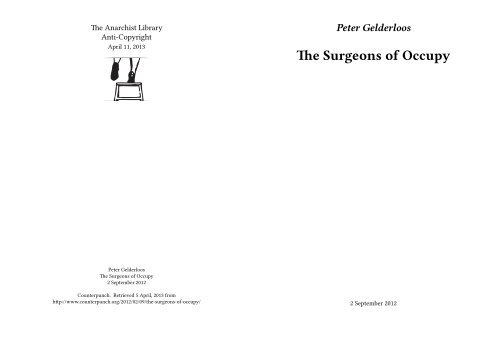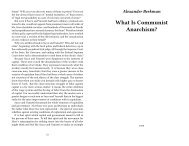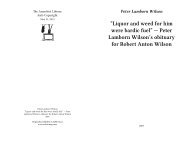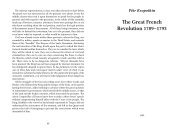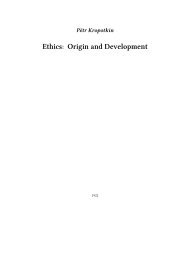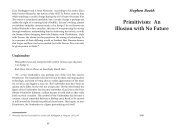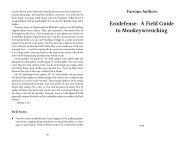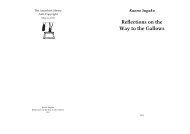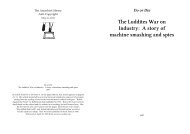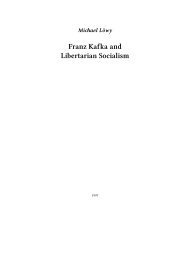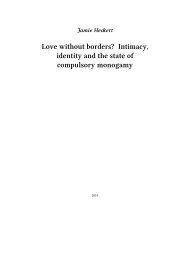A4 imposed PDF - The Anarchist Library
A4 imposed PDF - The Anarchist Library
A4 imposed PDF - The Anarchist Library
Create successful ePaper yourself
Turn your PDF publications into a flip-book with our unique Google optimized e-Paper software.
<strong>The</strong> <strong>Anarchist</strong> <strong>Library</strong><br />
Anti-Copyright<br />
April 11, 2013<br />
Peter Gelderloos<br />
<strong>The</strong> Surgeons of Occupy<br />
Peter Gelderloos<br />
<strong>The</strong> Surgeons of Occupy<br />
2 September 2012<br />
Counterpunch. Retrieved 5 April, 2013 from<br />
http://www.counterpunch.org/2012/02/09/the-surgeons-of-occupy/<br />
2 September 2012
een engaged in for months, and Hedges’ contribution is just the latest<br />
drop in the bucket.<br />
This form of co-optation and manipulation is nothing new for a movement<br />
that cynically harvested a few images from Tahrir Square–an unfinished<br />
popular uprising in which hundreds of thousands of people defended<br />
themselves forcefully from the cops, ultimately torching dozens<br />
of police stations–to declare a victory for nonviolence.<br />
Around the world, people are fighting for their freedom and resisting<br />
the depredations of the rich and powerful. In the United States, there is<br />
plenty of cause to join this fight, but as long as people continue enact a<br />
fear-driven, Not-In-My-Backyard pacifism, and to pander to the corporate<br />
media as though they would ever show us in a positive light, the<br />
rich and the powerful will have nothing to worry about.<br />
2 7
managed version of King) while demonizing or silencing the equally important<br />
Malcolm X or Black Panthers. Just as predictably, Chris Hedges<br />
does not mention that King vocally sympathized with the urban youths<br />
who rioted, youths whose contemporary equivalent Hedges calls “stupid”<br />
and a “cancer.” Ironically, Hedges refers to the famous Birmingham campaign<br />
attributed with achieving the end of segregation. What Hedges<br />
and pacifist ideologues like him fail to mention is that Birmingham was<br />
a repeat of King’s Albany campaign, which ended a total failure, all its<br />
participants locked up, and no one slightly moved by the supposed dignity<br />
of victimhood. <strong>The</strong> difference? In Birmingham, the local youths got<br />
fed up, rioted and kicked police out of large parts of the city for several<br />
days. <strong>The</strong> authorities chose to negotiate with King and replace de jure<br />
segregation with de facto segregation in order to avoid losing control<br />
entirely.<br />
It’s also hypocritical that on the one hand Chris Hedges utilizes King<br />
and parades the dignity of nonviolent suffering while on the other hand<br />
he uses the fear of getting injured by police or spending a few nights<br />
in jail to mobilize his comfortable, middle class readership to reject the<br />
black bloc and the dangers it might bring down on them. “<strong>The</strong> arrests last<br />
weekend in Oakland of more than 400 protesters [ . . . ] are an indication<br />
of the scale of escalating repression and a failure to remain a unified,<br />
nonviolent opposition.” He goes on to detail the horrible ways police<br />
attacked demonstrators, and the conditions in jail.<br />
It’s election year. Those who still have faith in the system, or those<br />
whose paychecks are signed by the major unions, the Democratic Party,<br />
progressive NGOs, or the left wing of the corporate media, know it’s their<br />
job to forcibly convert any popular movement into a pathetic plea to<br />
be made at the ballot box. <strong>The</strong> unmediated, experimental politics of the<br />
Occupy movement must give way to symbolic protest and dialogue with<br />
the existing “structures of power” whose members must be brought “to<br />
our side”. For the Occupy movement to be sanitized and converted into<br />
a recruiting tool for the Democratic Party, it will have to be neutralized<br />
as a space for real debate, experimentation, and conflict with authority.<br />
Its more revolutionary elements will have to be surgically removed. It is<br />
an operation the police, the media, and some careerist progressives have<br />
In his February 6 article entitled,“<strong>The</strong> Cancer of Occupy,”Chris Hedges<br />
attempts to analyze the political beliefs and practices of the black bloc,<br />
a group he characterizes as the scourge of the Occupy movement. Although<br />
Mr. Hedges evidently conducted at least a little to research his<br />
article, he does not quote a single proponent or participant of a black<br />
bloc, neither within the Occupy movement nor from any of the many<br />
other black blocs that have been organized in the United States. Such<br />
research would not have been difficult. <strong>The</strong>re are a plethora of anarchist<br />
blogs, websites, newspapers, and magazines that discuss Occupy, the<br />
black bloc, and even the use of the black bloc within Occupy protests.<br />
Despite this major failing, I cannot accuse Mr. Hedges of laziness.<br />
He does, after all, dig up an anarchist magazine published in Oregon<br />
ten years earlier and he quotes one particular article extensively. <strong>The</strong><br />
magazine, Green Anarchy, is tied in to Hedge’s tirade on the basis of<br />
the unsupported and inaccurate assertion that anarcho-primitivist John<br />
Zerzan, one of the magazine’s former editors, is “one of the principal ideologues<br />
of the Black Bloc movement”. In fact, the black bloc evolved–as a<br />
tactic, not a movement–in Europe and came to the United States without<br />
any input from Zerzan. Zerzan’s only link to the bloc is as one of the<br />
few public figures to have endorsed it.<br />
So why does he appear at all in Hedges’ article? Presumably to provide<br />
the link to Green Anarchy. And why Green Anarchy? Of all the anarchists<br />
and others who have participated in black blocs in the last decades,<br />
green anarchists or anarcho-primitivists have only been one small part.<br />
Labor union anarchists, anarcha-feminists, social anarchists, indigenous<br />
anarchists, Christian anarchists, as well as plain old, unaffiliated street<br />
youth, students, immigrants, parents, and others have participated in<br />
black blocs.<br />
However, for a mainstream audience susceptible to fear-mongering,<br />
the anarcho-primitivists can easily be portrayed as the most extreme, the<br />
most irrational, and this kind of crass emotional manipulation is clearly<br />
Mr. Hedges’ goal.<br />
Despite the tenuous to null connection between Green Anarchy and<br />
the use of the black bloc within the Occupy movement, he uses a skewed<br />
presentation of that magazine to frighten his readers away from a reasoned<br />
consideration of the political arguments on which the black bloc<br />
6<br />
3
is based. For the more intrepid readers, he finishes off the job with inaccurate<br />
and unreferenced generalizations such as, “Black Bloc anarchists<br />
oppose all organized movements [ . . . ] <strong>The</strong>y can only be obstructionist.”<br />
Hedges introduces the widely read Zerzan merely as an apologist for<br />
the ideas of Ted Kaczynski (<strong>The</strong> Unabomber). Referred to by one NBC<br />
reporter as “probably one of the smartest individuals I have encountered”<br />
and “very low key, reasoned, and non-threatening,” Zerzan is a far more<br />
complex figure, but such details fall outside of Hedges’ plan of attack.<br />
His characterization of Green Anarchy, and by extension, of all black<br />
bloc anarchists, is based on a single article that only appeared in GA as<br />
a reprint some ten years ago. Neither does Hedges admit that the article<br />
itself, “<strong>The</strong> EZLN are Not <strong>Anarchist</strong>,” generated considerable controversy<br />
and debate among anarchists, nor that GA itself published a response by<br />
several Zapatistas, which criticized the article for “a colonialist attitude<br />
of arrogant ignorance”.<br />
<strong>The</strong> openness to debate and criticism present in GA, is totally absent<br />
from Hedges’ latest work of journalism. <strong>The</strong> manipulation, cherry picking,<br />
and dishonesty that underlie his arguments show that for this awardwinning<br />
journalist, fairness is only a courtesy one extends to those rich<br />
or powerful enough to press libel charges. This conception certainly<br />
abounds in the pages of the New York Times, Hedges’ longtime employer.<br />
<strong>The</strong> medical language of Hedges’ title, referring to the anarchists as<br />
a “cancer,” should immediately ring alarm bells. Portraying one’s opponents<br />
as a disease has long been a tactic of the state and the media to<br />
justify the repression. This language was used against the Native Americans,<br />
against the Jews, against communists, and many others. Recently<br />
the police and the right wing used this same language of hygiene to<br />
talk about the occupations around the country as health threats so as to<br />
justify their eviction and generate disgust and repulsion.<br />
In sum, Chris Hedges deals with the “Black Bloc anarchists” with fearmongering<br />
manipulation and without the slightest glimmer of solidarity.<br />
But beneath the black masks, anarchists have been an integral part of<br />
the debates, the organizing, the cooking and cleaning in dozens of cities.<br />
<strong>Anarchist</strong>s also participated in preparing the original call-out for Occupy<br />
Wall Street, and they played a key role in organizing and carrying out<br />
the historic Oakland general strike and the subsequent West Coast port<br />
blockades–probably the strongest actions taken by the Occupy movement<br />
to date.<br />
<strong>The</strong> very fact that Occupy Oakland got out 2,000 people to fight the<br />
police for hours in an attempt to occupy a building, at a time when<br />
Occupy in other cities is dwindling or dead, contradicts the parallel<br />
claims that anarchists are trying to “hijack” Occupy and that their tactics<br />
turn people away. On the contrary, anarchists are part and parcel of the<br />
Occupy movement and their methods of struggle resonate with many<br />
people more than the staid, hand-wringing pacifism and middle-class<br />
reformism of careerists like Chris Hedges.<br />
It would be useful to debate the appropriateness of aggressive tactics<br />
in demonstrations, and anarchists themselves have often encouraged<br />
this debate, but Hedges has passed over the critique and gone straight<br />
for the smear. He calls the black bloc anarchists “a gift from heaven for<br />
the surveillance and security state,” choosing conspiracy theory paranoia<br />
to distract from the public record, filled with cases of government officials<br />
and the media alternately serenading and threatening the Occupy<br />
movement into an acceptance of nonviolence.<br />
Its proponents in the Occupy movement have generally protected nonviolence<br />
from an open debate, instead imposing it through manipulation,<br />
fear-mongering, and, when all else fails, turning their opponents over<br />
to the police. Hedges himself implies that illegal or aggressive tactics<br />
cannot exist in a space where “mothers and fathers [feel] safe”, ignoring<br />
the many militant movements built around the needs of mothers and<br />
fathers, such as his own favorite example, the Zapatistas. He also dismisses<br />
the concept of a diversity of tactics as a “thought-terminating<br />
cliché”, demonstrating a willful ignorance of–to name just one example–the<br />
many weeks of thoughtful debate that went into the “St. Paul<br />
principles“ that allowed hundreds of thousands of people with a huge<br />
diversity of political practices to come together in 2008 and protest the<br />
Republican National Convention.<br />
Predictably, Chris Hedges uses the name of Martin Luther King, Jr., to<br />
gain legitimacy for his stance, again contradicting his argument that the<br />
“corporate state” wants protestors to fight police and destroy property,<br />
given that this same corporate state venerates King (or at least a well<br />
4<br />
5


